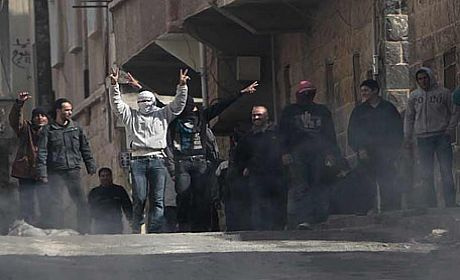Bullets or Dialogue

Since months ago, developments in Syria have been transformed from peaceful disagreements into military confrontation and have spread throughout this country. In the front opposed to the Syrian government, the role of the illegal armed groups has been highlighted and the National Council of Opposition, based in Istanbul and including political personalities residing in the West, has weakened. From the beginning of the formation of the National Council, many in the opposition front had problems with this council and today, with the growing volume of military conflicts inside the country, it does not seem possible that the armed groups accept the leadership of these politicians outside of the country.
Which direction are the developments in Syria heading towards? The events in Syria's domestic, political and international scenes indicate that the transition of power in this country is not an easy task. Accurate analysis of these developments shows that despite the intensification of clashes inside the capital and the big city of Aleppo and the explosion of important security centers, etc, the army and military still have the upper hand. Some regions are captured by armed groups but the army enters and cleanses these regions from these elements and the government regains control. In the international scene, Russia and China are still standing by their supporting positions for the existing regime in Syria and have vetoed the third resolution of the Security Council. Therefore, it does not seem accurate to imagine that the government of Bashar Assad will easily fall. Even if the Syrian regime falls due to any reason, something which seems improbable, there are numerous signs that the country will be drawn towards instability and chaos. Domestic conflicts are transformed into sectarian and tribal clashes and will continue for a long time. Radical factions will seek bloody revenge, the signs of which are seen in Aleppo.
The second point is the entrance of radical Islamic, and of course suspicious, forces into the scene of domestic armed conflicts in Syria. Based on confessions made by Western countries and reports of the intelligence services of the region and the admittance of non-Syrian armed groups under the title of so-called Jihadi and Salafi forces with Arab and non-Arab nationalities, these groups have entered the scene with the direct financial and armament support of regional and international countries. The characteristic of the presence of these groups is that, not only are they multi-national, but they also act independently and have no relations with the National Council. The future of Syria and the rights of its deprived people has no importance for these foreign radical groups. Destruction of infrastructures and national and governmental institutes and organizations bear no meaning for them. In their view, displacement of people and families, killing innocents, and the collapse of national unity are not important. The question of how these groups have entered Syria, from which border and with the support of which foreign country, and whether they seek to uphold the rights of the Syrian people is not discussed here. Rather, what is important is their impact on domestic developments in Syria. Today, they are the most active and effective forces opposing the Syrian regime. They are, willingly or unwillingly, considered as the representatives of the opposing powers against the government, meaning the US, the European Union, and the Arab League and not the residing politicians in Istanbul. In other words, the opposing powers of Syria now have to work with these radical Salafi groups in Syria and support them and they do not care about the severe contradictions that exist.
Analysis of Syria's events indicates that this crisis will not end in the near future. Continuation of this situation will undoubtedly lead to an all-out civil war. The prospect imagined by some of these opposing groups that consider the fall of the Syrian regime imminent and believe that they will soon control the future of this country is not a correct assessment. The Syrian army has shown that it has the upper hand in armed confrontations and has high capabilities. Obtaining political power, at any expense, even with foreign intervention (which follows its own goals) will certainly lead to the destruction of the country, the infrastructures, and national and governmental institutions. It seems impossible that the destruction and annihilation of the country is the real option of the people. Chaos, instability, and spread of insecurity and fear is certainly not approved by the people of Syria. Supporting the demands of the people by resorting to explosions of economic centers, gas and oil pipes, electricity and water centers, and communication lines are questionable. Which option do the people of Syria choose today?
It is obvious that talking about dialogue and a peaceful political solution has no basis today. Foreign countries, despite their claims of supporting people and opposing violence, do not seriously believe in dialogue. Negotiation and understanding is probably considered a defeat for them. But people will surely prefer peaceful political solutions to reach their logical demands. Considering the enormous pressure the government has been faced with during the past 17 months, it seems that it has to accept to seriously consider people’s participation and their demands and seek domestic dialogue and return of security to the country. The only way to save Syria and hope for this crisis not to spread to neighboring regions, which could have dangerous consequences, is through dialogue and political understanding.

